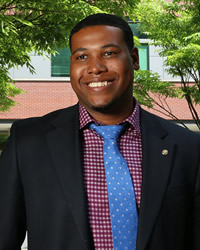
The United States prides itself on guaranteeing justice for all. But inequality in the justice system is still a persistent issue — one highlighted by the blockbuster Netflix documentary Making a Murderer.
Everything from police brutality to mandatory minimum sentences to the criminalization of poverty have spawned vibrant, and often contentious, political and social discussions.
However, one of the most basic needs for those engaging in the justice system has also been one of the most overlooked: access to proper legal aid.
Miguel Willis, a second-year law student at Seattle University, wants to do something about that problem. And that’s why he was inspired to create the Social Justice Hackathon, a two-day coding event sponsored by Seattle University which brought together 70 technology innovators and law professionals to address specific issues related to legal aid.

“The need for legal services far outpaces their availability,” Willis said, adding that many free legal aid services turn clients away because there’s such a large need.
Willis says the obstacles to accessing legal aid rise from three factors: a lack of education needed to dissect legal issues, not being able to afford a lawyer, and an overwhelmed pro-bono service system.
“The goal of the Social Justice Hackathon was to use innovation, collaboration, and technology to increase the access to legal services to underrepresented communities,” Willis said. “By having a variety of people at the table—tech people, students, law professionals— we can creatively think about what solutions we can find through technology to address this problem.”
The hackathon took place last November, and three teams moved on to develop fully functioning apps and web pages addressing a selection of obstacles in legal aid access. Those three winning teams will present their ideas to legal aid organizations and the public Wednesday night at the Social Justice Hackathon Demo Day, starting at 5:30 p.m. in the Bertha Landis Room at City Hall.
One of the ideas revolves around creating efficiency in pro-bono legal services, a topic that is close to the heart of Adelaine Shay who serves as program manager for the King County Bar Association’s pro-bono Neighborhood Legal Clinics.
Shay said that a lack of resources limits the time lawyers can spend with those who need help.
“Our legal clinics operate in spaces that aren’t ours—libraries, neighborhood service centers, etc.,” Shay said, adding that the clinics often don’t have resources like computers, printers or wifi. The clinics only have a limited physical supply of select court documents, so it can be difficult for lawyers to help clients find the resources they need to address a given legal issue.
“The idea is: how can we get some of these legal resources to people in a setting where we don’t have this kind of technology?”
Shay’s presentation prompted several hackathon attendees to create the Social Justice League. The first of the winning projects, this mobile webpage allows lawyers to record a client’s information and send them documents necessary for their case—all from a smartphone. Shay said this service removes the added barrier of people having to find documents themselves, and will free up time for lawyers to work with more clients.
A small test group of lawyers have been using the Social Justice League in clinics, and Shay said she plans on launching it in more locations soon.

Another way to decongest the legal aid bottleneck is to help litigants help themselves.
“There’s tons of ways technology can increase access or make it easier for people to navigate the legal system on their own,” Willis said. “If there is a person who does not need full legal representation to deal with their issue, they could go to an app or online to get the assistance they need.”
The hackathon’s second winner, The Court Whisperer, created an easy-to-use portal that can people can use to guide them through court processes without seeing a lawyer.
According to the Self-Represented Litigation Network, 75 percent of civil cases in the US involve at least one litigant who represents themselves—with no lawyer on their side of the courtroom. For anyone without a law degree, navigating a civil case like eviction, divorce, or debt litigation can be a messy and foreign process—but Americans are increasingly having to face that process on their own.
The app helps users understand and fill out dozens of legal forms. It also translates complex legal questions into simple English.
CourtWhisperer from Greg McLawsen on Vimeo.
The third winner focused on assisting litigants in a specific type of case: evictions. The Housing Justice Project, also run by the King County Bar Association, presented a specific need to the hackathon participants: unbanked tenants, who do not have a record that they paid rent, were being evicted and had no evidence to bring to court.
“They didn’t have any way to verify that they had paid their landlords,” Willis said.
Paid It!, the third hackathon winner, allows users to document all landlord payments. Users can snap pictures of a check, money order, or other payment method and record details like the purpose and recipient of the payment. The app also allows them to collect a signature of the recipient, providing a full record in case they need it during a legal dispute.
Paid It from Greg McLawsen on Vimeo.
Willis was thrilled with the collaborations and products that came from the hackathon—but the story does not end there. He wants all of these technologies employed by legal aid organizations.
“The core purpose of the hackathon is to solve real problems,” Willis said. “These are all problems that legal aid organizations have faced, and these are solutions that legal aid organizations can use.”



